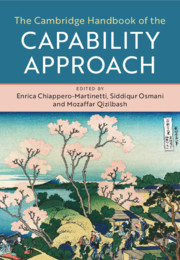The Cambridge Handbook of the Capability Approach
Langue : Anglais
Coordonnateurs : Chiappero-Martinetti Enrica, Osmani Siddiqur, Qizilbash Mozaffar

This landmark handbook explores cutting-edge research on the capability approach pioneered by Amartya Sen and Martha C. Nussbaum.
This landmark handbook collects in a single volume the current state of cutting-edge research on the capability approach. It includes a comprehensive introduction to the approach as well as new research from leading scholars in this increasingly influential multi-disciplinary field, including the pioneers of capability research, Martha C. Nussbaum and Amartya Sen. Incorporating both approachable introductory chapters and more in-depth analysis relating to the central philosophical, conceptual and theoretical issues of capability research, this handbook also includes analytical and measurement tools, as well as policy approaches which have emerged in the recent literature. The handbook will be an invaluable resource for students approaching the capability approach for the first time as well as for researchers engaged in advanced research in a wide range of disciplines, including development studies, economics, gender studies, political science and political philosophy.
Foreword Amartya Sen; General introduction Enrica Chiappero-Martinetti, Siddiqur Osmani and Mozaffar Qizilbash; Part I. Historical Antecedents and Philosophical Debates: Introduction to Part I Mozaffar Qizilbash; 1. The capabilities approach and the history of philosophy Martha C. Nussbaum; 2. Karl Marx and the capabilities approach David Leopold; 3. Utility and capability: J. S. Mill and Amartya Sen L. Wayne Sumner; 4. Intellectual history and defending the capabilities approach David Weinstein; 5. Sen, Smith and the Cambridge tradition Luigino Bruni; 6. The capability approach to well-being and freedom from the viewpoint of welfare economics and social choice theory Kotaro Suzumura; 7. Resources or capabilities? An introduction to the debate Ilse Oosterlaken; 8. Taking multidimensionality seriously: capabilities, Rawls's primary goods, and guiding action Henry S. Richardson; 9. The capabilities approach and political liberalism Richard Arneson; 10. Selecting a list: the capability approach's Achilles heel Rutger Claassen; 11. Individualism and the capability approach: the role of collectivities in expanding human capabilities Solava Ibrahim; 12. The politics of wonder: the capabilities approach in the context of mass extinction Jeremy Bendik-Keymer; Part II. Methods, Measurement and Empirical Evidence: Introduction to Part II Enrica Chiappero-Martinetti; 13. Social choice and the capability approach Maurice Salles; 14. On capability and its measurement Prasanta K. Pattanaik and Yongsheng Xu; 15. Analyzing capabilities: games, groups and effectivity Martin van Hees; 16. Implementing the capability approach with respect for individual valuations: an illustration with Colombian data Koen Decancq, Erik Schokkaert and Blanca Zuluaga; 17. Capability, opportunity, outcome – and equality Ravi Kanbur; 18. The distribution of capabilities: up, down, sideways and along Tania Burchardt; 19. Inter-group disparities in the distribution of human development: two apparent conundrums and how we might address them Peter J. Lambert and Sreenivasan Subramanian; 20. Multidimensional inequality and human development Suman Seth and Maria Emma Santos; 21. The research agenda on multidimensional poverty measurement: important and as-yet unanswered questions Sabina Alkire; 22. Measuring gender inequality using the capability approach: issues and challenges Stephan Klasen; 23. Econometric and statistical models for operationalising the capability approach Jaya Krishnakumar; 24. Expanding capabilities through participatory action research Alejandra Boni and Alexandre Apsan Frediani; Part III. Issues in Public Policy: Introduction to Part III Siddiqur Osmani; 25. On education and capabilities expansion Melanie Walker; 26. Capability approach to children's well-being and well-becoming Mario Biggeri; 27. Capability and disability Lorella Terzi; 28. Social exclusion and capability development Jonathan Wolff; 29. Human security Des Gasper; 30. Income inequality and human capabilities Rolph van der Hoeven; 31. The capability approach and human rights Polly Vizard; 32. Capabilities and the law Katharine Gelber; 33. Capabilities, public reason and democratic deliberation Jay Drydyk; 34. Entitlements and capabilities Sanjay G. Reddy and Adel Daoud; 35. Religion and the capability approach Séverine Deneulin and Augusto Zampini-Davies.
Enrica Chiappero-Martinetti is Full Professor of Economics and Head of the Department of Political and Social Sciences at the University of Pavia. She teaches economics, human progress and sustainable development, development economics and cooperation at undergraduate and graduate levels. She has acted as Vice-President of the Human Development and Capability Association and currently serves that Association as editor of the Journal of Human Development and Capabilities.
Siddiqur Rahman Osmani is Professor of Development Economics in the Department of Accounting, Finance and Economics at Ulster University. He has published widely on issues related to poverty, inequality, hunger, famine, nutrition, microcredit, rights-based approach to development, and development problems in general. He has been an editor of the Journal of Human Development and Capabilities and served on the editorial board of a number of development-related journals.
Mozaffar Qizilbash is Honorary Professor in the Departments of Economics and Philosophy at the University of York. He has published in journals in the fields of economics, philosophy and development studies. He has acted as Editor-at-Large as well as Vice-President of the Human Development and Capability Association and as an editor of the Journal of Human Development.
Siddiqur Rahman Osmani is Professor of Development Economics in the Department of Accounting, Finance and Economics at Ulster University. He has published widely on issues related to poverty, inequality, hunger, famine, nutrition, microcredit, rights-based approach to development, and development problems in general. He has been an editor of the Journal of Human Development and Capabilities and served on the editorial board of a number of development-related journals.
Mozaffar Qizilbash is Honorary Professor in the Departments of Economics and Philosophy at the University of York. He has published in journals in the fields of economics, philosophy and development studies. He has acted as Editor-at-Large as well as Vice-President of the Human Development and Capability Association and as an editor of the Journal of Human Development.
Date de parution : 11-2020
Ouvrage de 740 p.
17.7x25 cm
Thème de The Cambridge Handbook of the Capability Approach :
© 2024 LAVOISIER S.A.S.



